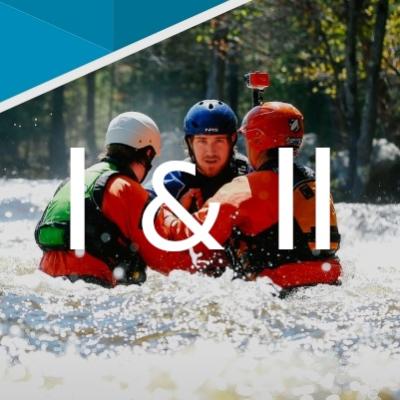
Wilderness Supply Whitewater Rescue (WWR) I & II
- Product Number: 4518 - 8403313
Course Date
May 14th - 15th, 2022
Location
Bird River, MB
Who Is This Course For
Beginner to intermediate paddlers, river leaders (guiding / instructing on introductory whitewater).
Prerequisites
14+ years
Details
A 2 day course that will help you build a solid foundation of skills and knowledge for paddling and travelling on rivers. Get hands-on practice and professional instruction. Gain the confidence to perform rescues and make smart decisions.
Take this course and achieve international certification that’s valid for 3 years. During that time, you can upgrade to the ‘technician’ level with the 2-day Whitewater Rescue Technician Bridge course.
Learning Outcomes
- Get tons of hands-on practice with experienced instructors, a great learning environment, and a well-run course
- Increase your knowledge of the river environment to avoid hazards and work with the water, not against it
- Practice techniques such as swimming, wading, and throwing ropes to move around the river, perform self-rescues, and rescue others
- Learn knots, anchors, and rope systems for use in equipment recovery and transportation
- Carry out effective rescues with limited resources when river running
Take Away Materials
- Certification card
- Waterproof course manual: Whitewater Rescue Field Guide
Topics Covers
Knowledge
- General concepts of whitewater and swiftwater rescue
- Personal and group equipment
- River safety and scene management
- River signals and communications
- River features and hydrology
- Related medical topics: drowning and hypothermia
Basic skills
- Swimming in moving water: self rescue and whitewater maneuvers
- Throw ropes
- Contact rescues
- Introduction to quick release rescue harness and ‘live bait’ rescue
- Rescue of panicked subjects
- Shallow water crossings
- Knots, anchors, and basic tensioning systems
- ‘Strainer’ swim
Rescue problems & scenarios
- Foot entrapment
- Kayak, canoe, and raft pins and wraps
- Managing flips and swims
- Rescue simulations
Course Format and Overview
Daily schedule
After registering, you’ll receive a ‘student information package’ with specific meeting times for your course. Typically class starts at 8:30am and goes to 6:30pm.
Attendance is mandatory
Attendance for 100% of class time is mandatory. If you can’t make a session you need permission from the instructor in advance. Students who miss a section of the course without pre-approval may be asked to leave the course.
Assessment and evaluation for certification
Practical assessment is ongoing within a supportive, professional, and fun learning environment.
Your certification is valid for 3 years from the date of issue.
To achieve the WWR Level II certification you need to
- Attend all sessions and participate throughout the course
- Demonstrate an understanding of river safety and river rescue skills
Equipment & Clothing to Bring
This is a general list of what to bring for a WRT-Bridge course. Please refer to your ‘student information package’ (emailed to you once you register) for a complete list specific to your course.
*Rental Equipment Is Available. Please call us at 204-783-9555 is you need to add any of the following to your enrolment:
Wetsuits = $55.00 + tax
Helmets = $10.00 + tax
Rescue PDF = $35.00 + tax
For the river:
- Whitewater helmet – You can rent one from us for the whole course for $10 CAD.
- Whitewater PFD (personal flotation device) – Needs to be in good condition and fit properly. A quick-release harness is not mandatory for WWR students. You can rent a rescue PFD from us for the whole course for $35 CAD—it comes equipped with a knife, whistle, and quick release harness.
- River shoes – closed toe with full toe coverage that are supportive but also lightweight and draining with a grippy sole. This could be a model made specifically for the river or a lightweight running shoe, trail-running shoe, or sneaker. Neoprene shoes can work if they have enough support and traction but neoprene socks or booties are not adequate.
- Wetsuit or drysuit – is necessary for courses before mid-June or past mid-September in eastern or central North America and always necessary on glacier-fed rivers. You can rent a full length wetsuit (4mm with fleece lining and full arms and legs) from us for the whole course for $55 CAD.
- Base layers, insulation, and socks – Make sure to have several layers of socks, pants, and tops made of wool, fleece, polyester, or another synthetic material to wear in addition to your wetsuit or drysuit (or to be worn on their own on sunny days and in warm water).
- Surf shorts
- Rash guard
- Snacks, lunch, and water bottle or thermos – Keeping yourself fueled with calories is one of the keys to staying warm and happy. We usually don’t stop for a long lunch break but instead, take several shorter eating breaks throughout the day so it is good to bring lots of food and things that don’t require much preparation on the side of the river. Also make sure to have some high calorie snacks that you can keep in your PFD pocket.
- Sunscreen, lip protection and bug repellent
- Neoprene gloves (optional)
- Neoprene head warmer (optional)
- Camera (optional)
- Sunglasses or prescription glasses with strap (optional)
For on land:
- Comfortable clothing
- Comfortable shoes
- Tuque (warm hat), gloves, or mitts for early and late season courses
- Sun hat, visor, or baseball cap
- Raingear
- Gear bag or container to store your equipment for transport
- Day pack or drybag to store your belongings during class
- Pens and notepad
Consider the following items but refer to the ‘student information package’ for your course to see the accommodation options available and a more specific list:
- Meals and cooking equipment
- Camping equipment or bedding
- Towel
- Personal hygiene products and medications
- Indoor clothing and shoes
